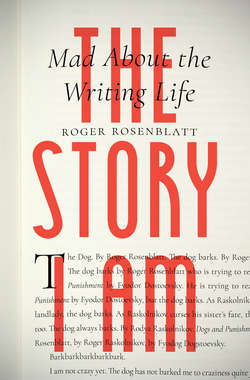Читать книгу The Story I Am - Roger Rosenblatt - Страница 28
На сайте Литреса книга снята с продажи.
ОглавлениеFathers’ Days
The first time I swam—I mean, all by myself, feeling only Long Island Sound beneath me, and moving, actually moving in that fearful, unnatural element that could take my five-year-old life away if I stopped moving—that very first time I did it, my father was not with me. Yet he had taught me to swim. Day after day at Compo Beach in Westport, Connecticut, he had stood waist high in the low-tide kiddy ocean, holding me about the middle like a magician proving there was no possible way his assistant could be supported, but supporting me surely, only relaxing his grip by the smallest degrees as he waited for the moment I would flip off like a tadpole on my own. As long as he was there, however, that moment never came. Feeling his support disappear, I would mount an inversely proportional panic, and by the time I was free I was lost.
But when he was away in New York one day, I swam, and immediately hollered to my mother to see what I could do. It was worth a holler. My parents had had a time with me that summer, especially after I’d acquired the inner tube, which, while it was no father, could still support me very well, thanks, way past the teenagers on the dock, and out toward Portugal. Every day at least once, one of my parents would turn to the other with an implicit “Where is he?,” and immediately look due west for a bump on the horizon. Then up would spring my father, who in those days had plenty of spring. And I would be saved. I loved to watch him come for me, chugging like a sub, I seeing as much pleasure as disapproval in his eyes as he towed me home.
He would have liked to see me take my first swim, I know, and I also know that I never could have swum with him close by, and worse, that I probably unconsciously timed my big moment deliberately to disappoint him, or to show him up—to confound his pride and love. That is the why it is so difficult to write of fathers and sons. The relationship is a continuous wrestling match in which arms and legs and victories and defeats are indistinguishable.
Such as the time eight years later, when we were on a short family holiday on Cape Cod, and my father and I agreed to swim out to a float and back. Being thirteen, I had so much strength, I never thought about it. Yet my father kept up, his dignified crawl beside my splashy riot. When we reached the float, however, his chest was heaving as if in sobs, and so he rested on the float for a while like a beached fish, before very cautiously dog-paddling back, holding on to the rope that led from the shore to the float, and sometimes holding on to me. Mortality, he explained, being the last thing I wanted to hear.
Or such as the time I accompanied my eldest son, Carl, then six, to a playground.
While he shot baskets, I sat reading on a bench at a distance great enough that an outsider might not see the connection between us. So when a couple of big boys came over, they thought my son was unprotected, and took his ball away to play a game on their own. Carl did not protest, merely taking his shots whenever the ball rolled his way. And when I called him to me to ask, discreetly, if he wanted me to intervene and get his ball back, he said, “No, Dad, I can handle it”—that also being the last thing I wanted to hear.
But you’ve got to hear it. Freud said it is a complicated business, the relationship of son to father. And I’m sure it is, since every father’s son is different. Yet most of the time it seems a terribly simple thing: The father sees his past and present in the son; the son, his present and future in the old man; and both resent and celebrate their fate.
“You want to be free, don’t you, boy. Well, who’s free?”
“I am.” (Insistently, followed by a million hours of shouting and needling, until the wrestlers, out of breath, slow down at last, and the match, while never totally finished, becomes careful and stately as if the combatants were wrestling in water, or in that dense blue fluid in the jar where the answers float to the top.)
After I was grown, so to speak, and had children of my own, and my father and I had worked out our SALT XXXV, and would meet in the summers, as world powers meet, to discuss this and that—then we were friends. At night, with everyone else asleep, we would sit together in the kitchen of some country house he rented, talking about the past and future, even talking politics, which took a long time to learn to do without explosions, and hearing the Atlantic in the long pauses. When we were ready to turn in, I would put away the glasses, but it was always he who locked the doors.
And when he died, and I realized that from then on it would be up to me to lock the doors, I wanted to say: Look, Dad, it was you who taught me to swim.
{ column in The Washington Post; essay on PBS NewsHour }
